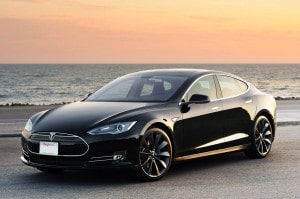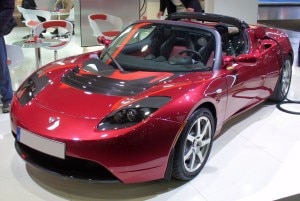
The Edison of our Age, Elon Musk, has built not one but multiple billion dollar technology companies and recently announced the updated version of the P85D is going to do 0-60mph in 2.8 seconds. By comparison, a recent model Bugatti will do 0-60 in 2.4 seconds and a Ferrari will do 0-60 in 2.6 seconds. For so long, the big bureaucratic car companies like GM and Ford tried to produce sexy electric vehicles but the best thing they’ve come out with is the Volt, ’nuff said. So given that Tesla is building a Gigafactory to mass produce batteries that have the potential to replace the electric grid, SUVs that get better gas mileage than the smallest smart car, and sports cars that earn you green energy tax credits while rivaling the performance of the world’s most established brands, why isn’t everyone buying Tesla shares?
The Earnings Problem
Tesla is losing money. Luckily its backed by one of the deepest pockets in the world, Elon Musk, whose diversified business interests in SpaceX, Tesla, and earnings from past cash cows like PayPal give him enough leeway to let the company lose money for an extended period of time. Like most people, I really admire his willingness to put his personal fortune on the line repeatedly for the cause of advancing human innovation and exploration. Because Tesla is backed by a once in a lifetime kind of founder, you might be tempted to look past financials and invest anyway.
By Musk’s own admission, Tesla will not be profitable until 2020. How then is a company that is not producing any earnings worth so much money?
The Low Interest Rate Gift to Tech Startups like Tesla
Right now the market is saying that Tesla is worth about $30 billion, or a little over 50% of the value of Ford Motor Company. Ford, the most successful of the American auto makers, made over $6 billion of pre-tax profit in 2014. How could Tesla, which is trying to produce tens of thousands of vehicles, be worth anything close to a company producing millions?
The answer is in the expected future earnings of the company. Let’s assume that Tesla will be profitable by 2020 as Elon Musk says. In another five years by 2025, let’s assume it’s making a boatload of money and producing millions of vehicles.
Without going into all the nitty gritty with the math, let’s say the discounted earnings of Tesla in 2025 justify a valuation of $100 billion. Meanwhile, let’s say Ford is chugging along and has the same $100 billion worth from discounted earnings at that time. By 2025 both are household brands that everyone knows and loves and have similar risk profiles. Which one is more sensitive to a sudden change in interest rates and risk appetites in the economy today?
To illustrate the great tech trap that Tesla and other tech darlings are benefiting from right now, take a look at a little math here.
$100 billion / ( ( 1+0.13 ) ^ 10 ) = around $30 billion
I picked an interest rate to get us to the current Tesla market value and to take into account that Tesla is a risky stock (the lower the discount rate for earnings, the safer the stock). What if interest rates go from 2% to a not impossible 5% ? How would that impact the value of Tesla in this hypothetical case?
First we would add the difference in interest rates to the level we need to discount earnings by, so instead of 13% we need to use 16% as a discount rate.
$100 billion / ( ( 1+0.16 ) ^ 10 ) = around $22.5 billion
which shows a value for Tesla 25% lower than today. This is just if the company has to deal with slightly higher interest rates and ends up being worth $100 billion in 10 years time which would be triple their current level.
Why You Should Treat Money in Tesla Stock As Speculation
In other words, good news for Tesla is not the only thing that has to happen for the company to be a good investment. The stock has had a fairly steep tumble over the past couple days in early August, and that was only because of delays in production of its SUV because of an “artistically designed middle seat.” For Ford, Mercedes, or any other big carmaker, this would be a minor problem impacting its company valuation. For Tesla, it can wipe out 8% of the company’s value in a day.
The tough part about buying Tesla is the stock price like so many others in Tech right now is supported by the low level of interest rates. When you have low rates, you do not need to discount earnings in the future by nearly as much when making an investment decision. This fact means that companies with a ton of earnings still way off into the future, ie your Facebooks, Twitters, GoPros, etc., should only have their mega billion dollar earnings in 2030 discounted back a little bit more than the pretty surefire earnings of Coca Cola and Proctor and Gamble. But wait! How smart is that.
Does it really make sense to not take future mega earnings with a big grain of salt compared to earnings today that are in hand? With all the easy money sloshing around the economy, everyone has gotten complacent. Tesla is supposed to have billions of dollars in profits in a decade or so. That’s a widely accepted base case. If anything happens that even slightly affects that trajectory, the market value could plummet at any time. There are no mega profits and millions of vehicle unit sales buffering you and your portfolio against a rise in interest rates, a tough economic spell, or a decline in consumer spending.
Buying Tesla Shares Is Fine, Just Recognize What You are Doing

Because the value of Tesla stock can fluctuate by 10% off of minor news announcements, it’s very similar to playing cards at a casino, where you have the shot at getting rich but there are so many uncertainties that if you go off and plan on that big mansion with all your winnings you could be very disappointed. The idea that a company with 0 earnings (Tesla) and a company with over $6 billion in earnings (Ford) could be worth anything close to one another seems far-fetched at best, foolish at worst.
If you hit it big investing in Tesla stock, you should view it the same way as if you won big money putting the ball in the roulette wheel and picking the right number. There are great growth investors to be sure, but most of them exist in the venture capital world, where they have the opportunity to get first looks at hot companies and get in before the public gets a chance.
The most famous investors you know are probably either value investors like Warren Buffett or venture capital people like Peter Thiel. Their styles are distinct, but there is a reason neither of these titans would want to give billions to a Tesla or other tech company once it has reached the multi billion valuation level. The reason is there is too much risk that you’re not getting paid for.
Mutual fund companies are usually the ones giving the big bucks to large firms like Tesla in their late stages because of the upside of the speculative return that you can get by being in the game, or simply because they make up big percentages of the benchmarks they get judged against. Yes, a big part of the money that gets dropped in big name companies is done mindlessly because of benchmark rules or fear of sticking out in a good or bad way in the performance rankings. The most sophisticated investors making value based judgments move early, for a reason.
So if you were thinking about putting money in Tesla shares, just know that the risk should be viewed in the same light as going down to Vegas and having a night at the tables, just over a longer period of time. To be sure, there is much greater social utility in giving money to Musk over a casino mogul to use for the benefit of mankind, but don’t expect to make tons of money. You still might, but investing in money-losing companies like Tesla is far riskier than a balanced portfolio of boring, dividend paying blue chips with reasonable valuations. They don’t offer the same upside potential that Tesla does, but neither does Tesla compared to its early days.
A great company is a fun place to work. Employees are engaged. The people that work there make great products that offer tremendous value, and the future of the world might be hugely impacted for the good of mankind by what the company is doing. A great stock is a security you can put money in and have a good chance at making a nice profit with limited downside over the long term.
Remember great company doesn’t always equal great stock. What matters in investing is what percent of the company are you buying and at what price relative to current and future earnings, while giving earnings today a much greater weight than expected earnings way off into the future. This strategy will help you reduce your risk and make more money. And you know what you can do with more money? Buy one of these:
Gives you goosebumps, doesn’t it?


This seems like a super reasonable article, but I am still intrigued by how the shift from fossil fuels and the addition of the home battery market will add to Tesla. Comparing growth of Tesla and Ford today makes sense, but I feel that in 10-15 years, environmental regulations and home energy could be pretty different.